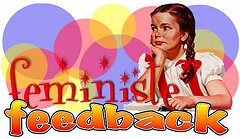
A reader writes in:
It’s clear to me that i have a lot to learn about feminism and feminist thought in general. I never was exposed to it in an academic setting (to my detriment, i fear) and i want to learn more, so that i can a. better represent a perspective that i know, deep down, is crucial and b. participate more in the conversation in a meaningful way. Besides your wonderful blog and some other online sources that i have found, can y’all recommend some Feminism 101 resources for someone who needs to explore this topic more? There are so many books, blogs, and other resources that i feel a little overwhelmed and i don’t know where to start. I know your readers would be able to point me in the right direction. Thanks for everything you do!
What are your favorite introduction-to-feminism materials, readers?
Remember you can write into Feministe Feedback by emailing feministe-at-gmail-dot-com.